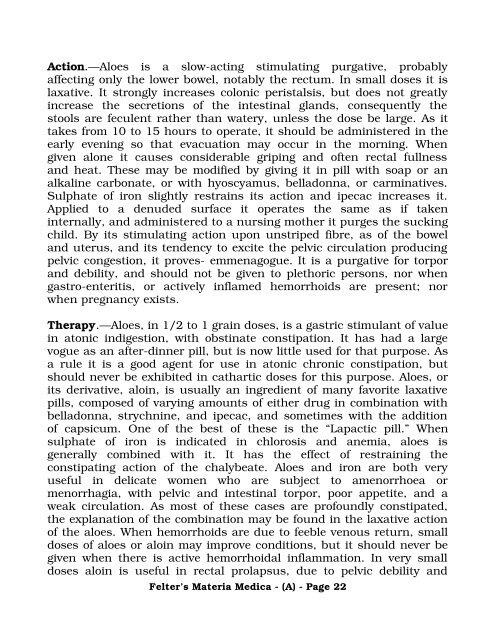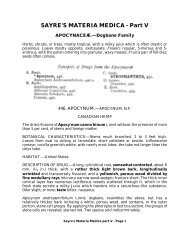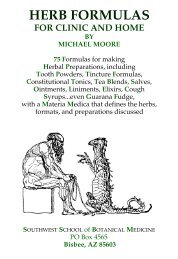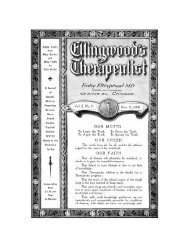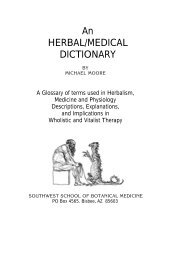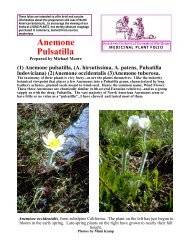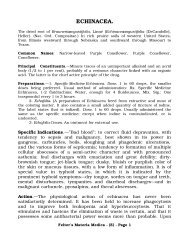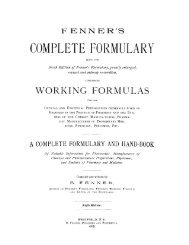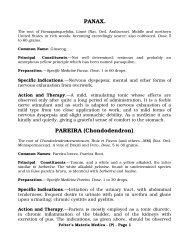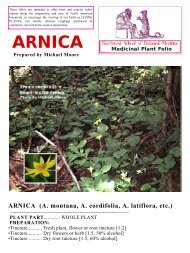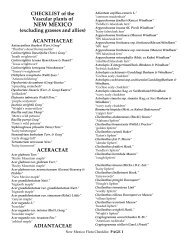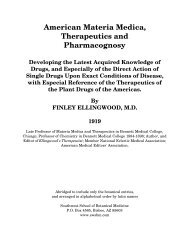Individual Drugs. ABIES (Tsuga canadensis). - Southwest School of ...
Individual Drugs. ABIES (Tsuga canadensis). - Southwest School of ...
Individual Drugs. ABIES (Tsuga canadensis). - Southwest School of ...
Create successful ePaper yourself
Turn your PDF publications into a flip-book with our unique Google optimized e-Paper software.
Action.—Aloes is a slow-acting stimulating purgative, probably<br />
affecting only the lower bowel, notably the rectum. In small doses it is<br />
laxative. It strongly increases colonic peristalsis, but does not greatly<br />
increase the secretions <strong>of</strong> the intestinal glands, consequently the<br />
stools are feculent rather than watery, unless the dose be large. As it<br />
takes from 10 to 15 hours to operate, it should be administered in the<br />
early evening so that evacuation may occur in the morning. When<br />
given alone it causes considerable griping and <strong>of</strong>ten rectal fullness<br />
and heat. These may be modified by giving it in pill with soap or an<br />
alkaline carbonate, or with hyoscyamus, belladonna, or carminatives.<br />
Sulphate <strong>of</strong> iron slightly restrains its action and ipecac increases it.<br />
Applied to a denuded surface it operates the same as if taken<br />
internally, and administered to a nursing mother it purges the sucking<br />
child. By its stimulating action upon unstriped fibre, as <strong>of</strong> the bowel<br />
and uterus, and its tendency to excite the pelvic circulation producing<br />
pelvic congestion, it proves- emmenagogue. It is a purgative for torpor<br />
and debility, and should not be given to plethoric persons, nor when<br />
gastro-enteritis, or actively inflamed hemorrhoids are present; nor<br />
when pregnancy exists.<br />
Therapy.—Aloes, in 1/2 to 1 grain doses, is a gastric stimulant <strong>of</strong> value<br />
in atonic indigestion, with obstinate constipation. It has had a large<br />
vogue as an after-dinner pill, but is now little used for that purpose. As<br />
a rule it is a good agent for use in atonic chronic constipation, but<br />
should never be exhibited in cathartic doses for this purpose. Aloes, or<br />
its derivative, aloin, is usually an ingredient <strong>of</strong> many favorite laxative<br />
pills, composed <strong>of</strong> varying amounts <strong>of</strong> either drug in combination with<br />
belladonna, strychnine, and ipecac, and sometimes with the addition<br />
<strong>of</strong> capsicum. One <strong>of</strong> the best <strong>of</strong> these is the “Lapactic pill.” When<br />
sulphate <strong>of</strong> iron is indicated in chlorosis and anemia, aloes is<br />
generally combined with it. It has the effect <strong>of</strong> restraining the<br />
constipating action <strong>of</strong> the chalybeate. Aloes and iron are both very<br />
useful in delicate women who are subject to amenorrhoea or<br />
menorrhagia, with pelvic and intestinal torpor, poor appetite, and a<br />
weak circulation. As most <strong>of</strong> these cases are pr<strong>of</strong>oundly constipated,<br />
the explanation <strong>of</strong> the combination may be found in the laxative action<br />
<strong>of</strong> the aloes. When hemorrhoids are due to feeble venous return, small<br />
doses <strong>of</strong> aloes or aloin may improve conditions, but it should never be<br />
given when there is active hemorrhoidal inflammation. In very small<br />
doses aloin is useful in rectal prolapsus, due to pelvic debility and<br />
Felter’s Materia Medica - (A) - Page 22


